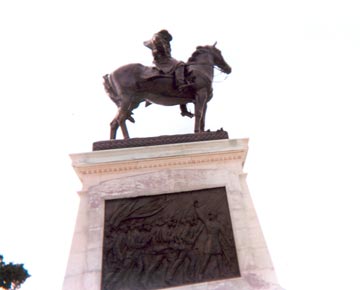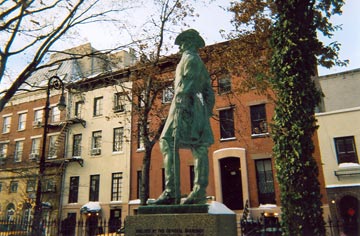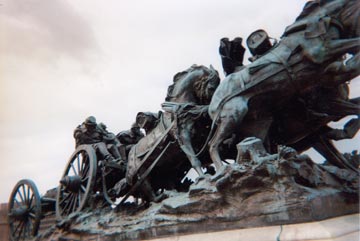“Mister Lincoln”, the assassin and the deputy. The basques and the american Civil War (1861-1865)
Carlos RILOVA JERICO
Traducción al español
It happened, exactly, 140 years ago, the date was 14th april of the year 1865. The happy owners of a copy of the recently remasterized David Wark Griffith’s “The birth of a nation” should remeber these facts perfectly as that mythical movie shows some scenes where John Wilkes Booth -the assassin alluded in the title of this article- shot his gun against Abe Lincoln, the magnanimous president of the newly restored United States of America, while he was watching a play in the Ford Theatre of Washington D. C. peacefully.
 |
| Grant´s monument, Washington D. C. |
Every book of History agrees when they consider the reasons that explain this assassination wich, following the authorized opinion of Edgar Lawrence Doctorow, starts that so-called “american century” wich has lasted, perhaps, until the present day: John Wilkes Booth, who initiated a relatively large list of terrorist outrages against the presidents of these States that, indeed, after a four years war were still United, was a fanatic confederate and as the veterans who sang “I’m a good old rebel”, he didn’t surrendered at Apomattox, he didn’t “want no pardon for anything he has done” and he dreamed about new yankee casualties.
As there was no trial where he could produce other reasons to explain his misbehaviour we must accept that, indeed, those were his only guide to do what he did.
It is true. After the assassination John Wilkes Booth, like any good actor, played an spectacular go off jumping from the president’s box to the stage. That was the last place where he was seen. Indeed, nor the recently institued United States Secret Service, raised to avoid -quite unsucessfully- new outrages against US presidents, nor the Police could get him back from wherever he found shelter after his run.
Surprisingly -or perhaps not so- that event has not encouraged the well know “industries” of Historical Centennials. Indeed, the anniversary of Lincoln’s assassination has been ignored. United States Federal Government did not promote conmemorative events. At last not of the same scale of those wich were organized during the Bicentennial during the year 1976, wich rolled up the whole globe. Something quite striking. Even more if we consider that this Government it is now ruled again by that same republican party wich Lincoln contributed to raise. No best-seller about the Civil War or about that assassination has been wrote. The publishing houses of the United States (and that means, more or less, any publishing house around the world) have refused even to reprint works on Civil War and Lincoln’s life and death signed by established authors, both alive, as the aforementioned E. L. Doctorow and his “The waterworks”, or dead as William Faulkner or the indispensable -at least in that event- Gore Vidal.
Hollywood has refused too that anniversary. So the dream factory has not dreamed about new profitable hits like the previously alluded “The birth of a nation” or, more recently, “Cold mountain”, to say nothing about the flamboyant “Gone with the wind”.
An attitude quite curious, even weird. Specially if we consider the repercussion that these facts enjoyed one hundred and forty years ago. Worldwide, but mainly in Europe, where its inhabitants looked completely fascinated at that war wich could mean both the disintegration or the consolidation of that giant still asleep who vaguely threatened the old continent.
The inhabitants of the Basque Country, as conspicuous europeans, were not the exception to that rule despite today could seem not easy to believe. Available documents are quite clear on this subject. The urban society of the basque provinces was deeply affected not only by the assassination of that one they called “Mister Lincoln” but by that war wich preceded it. The papers of Daniel Evans, the consul who defended the interests of Washington D. C. in the Basque Country, or some documents owned by the guipuzcoan MP Fermín Lasala y Collado show how the attenttion of the basque upper and middle classes was quite captivated by the american civil war.
 |
| From left to right: Lincoln´s portrait once cent coin. Fermín Lasala y Collado. |
As the Microfilm Service of the Basque Country University allow us, let’s we take a look inside the diplomatic bag of Daniel Evans. Then we can visit once more time the archives of Fermín Lasala jr. who, as we can learn reading former numbers of that same magazine, was not the last basque interested in the american civil war progress.
The information inside that bundle of correspondance preserved by the National Archives and Records Administration of the United States, it is relatively brief. It is only a handful of letters and reports sent by Evans to the attention of the honourable William Seward, that Lincoln’s secretary of State who was relentelessly portrayed by Gore Vidal. Nevertheless we can read and learn there wich was the basques’ frame of mind both toward the yankees and their enemies.
Then, Daniel Evans, being true to his diplomatic routine -that is: observing and reporting useful advice to his Government- reflects, exactly, the impact of the american civil war among the basques.
His first report was sent october 1st 1862, one year after the beginning of the war. There he produced some news on rumours about confederate ships harboured in Saint Sebastian’s bay in august. Despite his informers there have assured him that all was a fake, he redoubled his surveillance upon that port to avoid any kind of contact between the Confederacy and this basque emporium. Something that disturbed deeply Daniel Evans, because he feared that the basque coast and its “popular sentiment” should be won by the confederates. Just as it has happened in the main part of Europe, as he explained to the honourable secretary Seward in this same letter.
In fact a reasonable uneasiness because that basque public opinion did not, in the own words of Daniel Evans, “so strongly favor the Rebellion as Elsewhere in Europe”. An uncommon reaction wich Evans attributed to the loyalty granted to Lincoln’s government by the papist clergy of the frontier states who have won over any european catholic priest for the Union cause. A number in wich we must include the basque servants of God of that year 1862.
But even despite this the consul feared that this favourable state of mind should vary deluded by other media not exactly linked to the efficcient worldwide vatican net. The target of Evans’ suspicions was the London Times. This famous paper, generously distributed in any european club, favoured the rebels. A disgusting event that Evans tried to cut out suggesting the massive dealing of some New York paper to equilibrate the black propaganda against the Union usual in the european papers.
 |
| Sheridan’s monument, NYC. |
Putting aside the sucess of that first campaign to clean the image of the United States in the Basque Country, it is indubitable that the confederate enemy carried on its maraudings among Daniel Evans’ consular dominions almost until the war was over. Indeed, a letter sent april 1st 1864 revealed that the rebels strolled up and down the whole Basque Country comfortably, something that disturbed deeply Daniel Evans and some people of that territories who he defined as “loyal Americans”.
Something quite true. If we read this memorandum we can learn that some pirate ships -that is the way Evans named them- of the pretended Confederacy, did not entered the basque harbours to acquire wares or coal supplies. He knew that the Florida sailed before the biscaian coast the last autumn but, just as any rebel ship, she did not tried to came into port. Fresh reports from Saint Sebastian, a port still under Daniel Evans’ narrow surveillance, told the same news: that bay, considered by the consul as a “very good harbour”, did not sheltered confederate vessels designed to run that blockade wich the Union used as a weapon to put on its knees the Confederacy. Besides that Evans tried to do his best to turn the commerce from Bilbao and Saint Sebastian -he reported detailed statistics about that- to Union ports. A quite sucessful attempt as we can guess reading his letter date 30th september 1864 where he explained satisfiedly that cargoes of bacon and petroleum from New York City have reached Bilbao port, a place where he foresee new bussiness of that kind with “some mercantile houses” of that town.
But, despite these favourable news, notorious confederates carried on their shameless strolling around Evans’dominions enjoying the delicacies of that Basque Coast wich had became already a famous summer resort. Evans was specially worried about the maraudings of “the pretended Confederate minister (that is, ambassador)”. During the last summer he has been seen at Bayonne and, of course, at Biarritz. He was escorted by his family and a bunch of americans not exactly loyal to the Union.
A troublesome affair, even despite the confederate ambassador decided to take him and his followers to Pau distant from Bayonne three hours by train, because both towns -as Evans do not forget to emphazise- were very close to Saint Sebastian. Not a good new for the Union as Bayonne was strongly subdued by a confederate influence wich could contaminate other basque towns, Saint Sebastian in first place, that, in such a case, should furnish a new and excellent port to the rebels.
But perhaps that was a fear quite exagerated, too prudent, because against all that consular distrusts the basque public opinion -at last the one lodged south of the river Bidasoa- did not change by no means, remaining favourable to the Union during the whole war. Something that was admitted even by Daniel Evans, as we can read in one of his last letters, wrote january 2nd 1865, when the conflict was almost over.
There he reported that, besides the catholic clergy, the Union cause got a powerful help provided by the newspaper “Irurac-bat”. That one was sketched in Evans’ report as an influental paper and quite well edited. Was also described as the first responsible for that cordial frame of mind among basques and specially among the bilbainers because has always defended that the Federal victory was the best not only for the european material interests but for Mankind moral interests.
As it seems the member of Parliament Fermín Lasala y Collado was of that same opinion. It is true that, as it was pointed by professor Mikel Urquijo, that Saint Sebastian tycoon was not exactly an abolitionist. At least, when the spanish chamber decided to abolish that pernicious institution in their colonies his vote was not clearly favourable to that change. Nevertheless that hesitation did not prevented him from reading an speech before the spanish lower house during the session of may 1st 1865 asking the government from his opposition seat, as a member of the Liberal progressive party, about the measures adopted by this institution to express properly the condolence of the spanish nation for the death of the one he calls “President of the United-States”, who -using again his own words-, has felt “under an assassin’s bullett” to crown, sadly, “the huge pyramid of corpses” caused by that civil war wich he describes as “titanic”.
Fermín Lasala y Collado decided that premier’s answer was enough satisfactory, but, nevertheless, the basque deputy asked for an unanimous vote to add the lower chamber’s condolence to the one sent already by queen Elizabeth’s government to Washington D. C. That fortright proposal was completely sucessful. Even more, two days after count of Vistahermosa, member of the spanish Senate, echoed before that assembly Fermín Lasala’s speech and get a new unanimous vote of that gathering to add a new condolence for mister Lincoln’s death.
 |
| Grant´s monument, Washington D. C. |
Probably his soul found new reasons to rest in peace thanks to these new condolences proposed by Fermín Lasala junior. That is more than we can say about different events of that Civil War closed with Abraham Lincoln’s assassination, wich walked again among the pages of some of the History books written by this basque member of parliament, who tried to learn some valuable lessons from the Alabama’s sinking in front of the british coast, the combats around Frazier’s farm or the confederate defeat. That one wich he compared to that other he helped to inflict in the year 1876 to the carlists, fighting as a volunteer during a war that, sometimes at least, resembled that other wich was settled one hundred and forty years ago with Abraham Lincoln’s death, an event hardly remembered nowadays.
euskonews@euskonews.com
